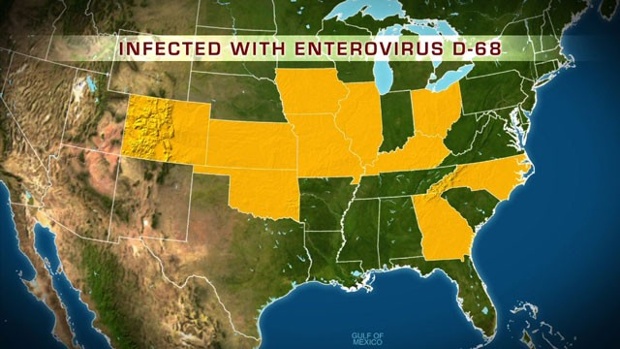Enterovirus D68: What You Should Know
October 15, 2014
Enterovirus D68 Spreading
With one confirmed case of Enterovirus D68 in Cayuga County, many parents are cautious about their children becoming sick this year.
Enteroviruses are not at all uncommon; they are usually the viruses that cause people to get colds during the summer. The Center for Disease Control says there are over 100 strains of enterovirus worldwide, and in the United States, more than 10 million people are collectively infected annually. Most become ill around September, when the seasons change. This is the time of year when the virus spreads the fastest. .
Although these statistics may make the virus out to be something not worth much attention, this year there have been an unprecedented number of people becoming infected, mostly children in the Midwest. On top of this, the strain of enterovirus making the kids sick, D68, is relatively rare, making tracking and fighting it very difficult. Every day, hundreds and hundreds children have been admitted to hospitals where they are placed in intensive care and not released until completely healthy. Many are scrambling to figure out how to handle the load of work presented to them, and no one knows why the virus has spread so much this year.
Enterovirus D68 usually starts out with symptoms mirroring those of the common cold; coughing, fever, weakness and possibly even a rash. As it progresses, difficulty breathing and wheezing become more prominent. D68 is unique as it is the only strain of enterovirus to cause mainly respiratory issues. Although it is not usually deadly, a few have died this year from the virus.
There is no vaccine to combat EV-D68.
“I’m really not nervous that the enterovirus will have serious and grave impacts on the US,” says junior Jarianna Gleason, who happens to be very interested in the medical field. “If we can relatively contain something as serious and deadly as Ebola here in the US, I’m sure the enterovirus can be handled much more effectively.”
“It may be spreading really fast, but that’s a given for any disease infecting people who don’t have antibodies against it,” Gleason reassures us. “Hopefully a vaccine can be developed since this strain is already in a family of viruses that we can treat.”
With one case currently in New York State, we can only hope that the illness will not spread much further, and that the virus will be treated effectively to stop it from infecting even more children.
